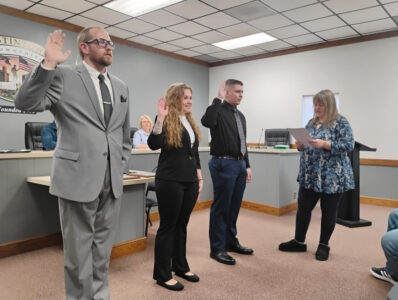Senate overrides governor’s veto on levy issues
The Ohio Senate voted to override a governor’s veto on what levies can be put on the ballot.
The Republican-controlled Senate met Tuesday and voted 21-11 to override Gov. Mike DeWine’s July 1 veto. All but two Senate Republicans — Bill Blessing of Colerain and Tom Patton of Strongsville — voted in favor of the veto override with all 10 Democrats voting against it.
The Republican-controlled Ohio House met July 21 in special session to override the veto, but couldn’t muster the needed support to override two other vetoes by DeWine, a Republican.
The veto override will eliminate, starting next year, the ability of school districts and local government entities to seek replacement or emergency levies from voters, as well as ban school districts from seeking fixed-sum emergency levies, substitute emergency levies and renewal levies with increases.
Republicans say the override doesn’t help homeowners with immediate tax relief, but it will make tax requests easier for voters to understand. They also say much more is to come.
State Sen. Al Cutrona, R-Canfield, said: “This veto override was one of many efforts for property tax reform in the state operating budget. Ohioans deserve transparency when at the ballot box. This provision will prevent property tax increases by restricting replacement and emergency levies.”
Democrats criticized the override because it strips local communities, schools and libraries of their ability to present certain levies to voters.
When the Ohio House met July 21 it was unable to get enough support to override two DeWine vetoes it planned to consider. That left the Republicans in the Senate to not hold their own special session and wait until Tuesday, when its regular schedule resumed, to override the veto.
Of the two other vetoes that Republicans will consider overriding later this month, one gives county budget commissions — made up of the county auditor, treasurer and prosecutor — control over tax rates and levies.
The commission would be permitted to unilaterally cut property tax rates if revenues exceed expenditures, even if voters approved ballot initiatives for that funding.
The other requires school districts to include emergency and substitute levies in their 20-mill floor, which guarantees they receive at least 20 mills of funding even if they are below that amount. This would put about 200 of the state’s 611 school districts off the floor.
The House will consider veto overrides as early as this month. The Legislature has until Dec. 31, 2026, to override the vetoes.
If there isn’t enough support for veto overrides, state Rep. David Thomas, R-Jefferson, introduced two standalone bills last week with the same language that he said would move forward.
Thomas said if the latter should occur, he doesn’t expect DeWine to veto them.
The Ohio Property Tax Working Group, which DeWine formed after the July 1 vetoes, recommended Tuesday that county budget commissions be given the power to reduce levies at least five years after their initial approval by voters and at least two years following a renewal of the levy by voters.
The working group also recommended the elimination of substitute levies, renaming all current substitute and emergency levies as fixed-sum levies, and applying them to the 20-mill floor.
As for the veto override, the working group recommended school districts under fiscal watch or emergency be permitted to ask for emergency levies. But that is moot with the override.



